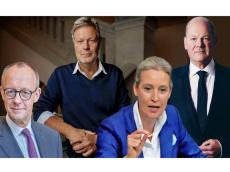|
|
TODAY.AZ / World news
Germany goes to polls to elect new government
23 February 2025 [15:37] - TODAY.AZ

Germans head to the polls Sunday in a nationwide election to select a new parliament and government — a landmark vote that could reshape the country's political landscape, Azernews reports citing Anadolu Agency.
Polling stations opened at 8 a.m. (0700GMT) at nearly 90,000 locations across the country and will close at 6 p.m. (1700GMT).
More than 59 million German citizens are eligible to vote in the elections, including 2.3 million first-time voters, according to official data. The electorate leans heavily on the older side, with 42% of voters aged 60 or above, compared to just 13% under 30.
Over 7 million eligible voters have immigrant backgrounds, including more than 1 million German citizens of Turkish origin.
While some Germans have already submitted their mail-in ballots, thousands of citizens living abroad have reported on social media that their postal voting documents have not arrived in time.
Opposition leader Friedrich Merz's Christian Democrats (CDU/CSU) are favored to win the election, though they are not expected to gain enough seats to form a government on their own.
The latest INSA polling data shows the center-right CDU/CSU alliance commanding 29.5% of voter support, maintaining more than 14-point lead over Chancellor Olaf Scholz's struggling Social Democratic Party (SPD).
The far-right Alternative for Germany (AfD) has reached 21% in the latest poll, setting up for its strongest federal election performance yet and positioning itself as the second-most powerful political force in the country.
A survey released Thursday showed that nearly 27% of voters remained undecided just days before the election, unsure whether to vote or which party to support.
Germany’s chancellor is elected indirectly, with voters choosing new parliament members, who then pick the new chancellor with a vote among themselves.
If the winning party secures a majority in parliament, or manages to build a coalition government with an absolute majority, its candidate becomes the country’s next chancellor.
Germany uses a mixed voting system where each citizen casts two ballots. With their first vote, they choose a specific candidate to represent their local district. Their second vote supports a political party, determining the party's total representation in the 630-seat parliament.
Chancellor Scholz's three-party coalition government—comprising the SPD, Greens, and FDP—collapsed in November due to disagreements over the budget, welfare programs, climate targets, and whether to take on new debt for investments. Instead of leading a minority government, Scholz opted for snap elections, saying Germany requires a strong and stable government to tackle its pressing challenges.
URL: http://www.today.az/news/regions/257223.html
 Print version
Print version
Connect with us. Get latest news and updates.
See Also
- 01 April 2025 [23:30]
Xiaomi electric car accident in China cause company's shares to fall - 01 April 2025 [23:30]
Xiaomi electric car accident in China cause company's shares to fall - 01 April 2025 [19:48]
Sweden invests 9.3 million euros in bunker modernization - 01 April 2025 [19:21]
Chinese scientists create 3D printer that prints ready-made food - 01 April 2025 [18:36]
PLA launches exercises near Taiwan island - 01 April 2025 [09:00]
Finland's president urges Trump to set April 20 deadline for Ukraine ceasefire - 01 April 2025 [08:00]
Netanyahu announces escalation of military pressure on Hamas as Israel seeks hostage release - 31 March 2025 [21:45]
Trump to visit Saudi Arabia in May in first foreign trip since returning to White House - 31 March 2025 [19:35]
Scientists creates revolutionary "lightsail" for interstellar travel - 31 March 2025 [19:05]
Britain additionally purchase F-35s from United States
Most Popular
 Western Zangezur: A chronicle of ethnic cleansing that Armenians are trying to erase
Western Zangezur: A chronicle of ethnic cleansing that Armenians are trying to erase
 Armenia on the verge of economic collapse - sanctions fraud failed
Armenia on the verge of economic collapse - sanctions fraud failed
 Baku Conference: New chapter in the fight against colonial legacies [OPINION]
Baku Conference: New chapter in the fight against colonial legacies [OPINION]
 Photo contest "Agriculture in Azerbaijan" underway
Photo contest "Agriculture in Azerbaijan" underway
 Emmanuel Macron's Plush Troops
Emmanuel Macron's Plush Troops
 Azerbaijanis in Europe protest for justice at Hague’s Peace palace
Azerbaijanis in Europe protest for justice at Hague’s Peace palace
 US Embassy Chargé d'Affaires congratulates Azerbaijani people on Ramadan holiday
US Embassy Chargé d'Affaires congratulates Azerbaijani people on Ramadan holiday
